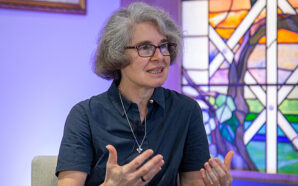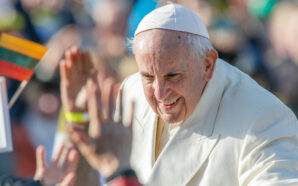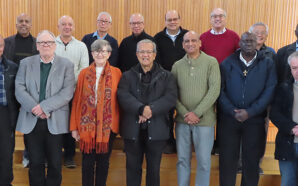His Eminence, Cardinal Charles Bo, Archbishop of Yangon, Myanmar gave Catholic Outlook the privilege of a wide-ranging interview on current issues faced by the Catholic Church in Myanmar.
During this special two-part interview, Cardinal Bo gives his insights into Aung San Suu Kyi, discusses the Rohingya people and appeals to the international community for help in rebuilding his country following decades of conflict. Cardinal Bo is currently touring Australia as a guest of Catholic Mission. Catholic Mission’s major Church Appeal in 2018 is raising funds for education programs in Myanmar backed by Cardinal Bo.
Cardinal Charles Maung Bo SDB, was born in Monhla Village, Myanmar. He studied at “Nazareth” Salesian Aspirantate, Anisakan, in Pyin Oo Lwin and made his First Profession on May 24, 1970 and his Final Profession on March 10, 1976. He was ordained to the priesthood of Salesians of Saint John Bosco, in Lashio, N.S.S. on 9 April, 1976.
Upon ordination, he was assigned as Parish Priest at Loihkam from 1976 to 1981, and in Lashio from 1981 to 1983. After serving as Parish Priest, from 1983 until 1985 he was posted at Anisakan as Formator. He served as Apostolic Administrator in Lashio from 1985 to 1986 and as Apostolic Prefect from 1986 to 1990. When the prefecture was elevated to the status of diocese (7 July 1990), he was appointed as first bishop of the new diocese. He received Episcopal consecration on 16 December of the same year.
Cardinal Bo is a member of:
- Congregation for Institutes of Consecrated Life and Societies of Apostolic Life;
- Pontifical Council for Culture;
- Secretariat for Communication.
He was appointed as bishop of Pathein by Pope John Paul II on 13 March 1996. On May 24, 2003, he was nominated Archbishop of Yangon and was installed on 7 June, 2003. Created and proclaimed Cardinal by Pope Francis in the consistory of 14 February 2015, of the Title of Sant’Ireneo a Centocelle (St. Irenaeus at Centocelle).
He served as president of the Catholic Bishops’ Conference of Myanmar from 2000 to 2006 (Source: The Vatican).
Catholic Outlook: Your Eminence, thank you for the privilege of this interview. What are the main challenges facing the Catholic Church in Myanmar today?
+Cardinal Charles Bo: In the past we were under the military regime for 60 years, and also of course civil conflict, the civil war for 60 years, especially with the ethnic groups, the majority which would be the Christians, who the military would call the Christian rebels.
Still that continues and is still happening, even now.
For the Catholic Church now, we are trying to work towards education.
The schools have been nationalised since 1965. One of our biggest needs and the Church sets a priority is the education of the children and the young people because of a lack of education. Many of our young people migrated as migrant workers to nearby countries.
Some of them became slaves in nearby countries and have been trafficked.
At present, we need lots of international help to work towards the education. The country has been open two to three years, people do not understand the freedom or they don’t know what the democracy.
The influx of media, the use of smartphones, YouTube and Facebook and many young people are addicted to that. Maybe 80 per cent of young people join hate speech and join extremist monks who preach against the Muslims, these are some of the things we face a challenge on.
Our young people need education, make use of the freedom, really, they don’t know what freedom is or what democracy is, they have been voicing democracy but actually they don’t know what democracy is. So, there is a lot of education that is needed.
Also, regarding the Church and Church personnel, because of this closed door policy of the past six decades, the field of formation, for the formation of faith and faith of the people, formation of the seminaries, and formation of the religious house, we need formators.
CO: Can you explain to your Australian audience why there is interest amongst the Bishops of Myanmar with how the Holy See–China relations are developing? How does this affect the Catholic Church in Myanmar?
+B: Last 8th of May, when the Bishops met with Pope Francis, we had a conversation for one and half hours, we asked about relations between the Vatican and China relations. The Pope was telling us there are three ways we are working with China.
One, is the diplomatic relations which Cardinal Parolin [Cardinal Secretary of State] is very much involved with.
Second, our personnel contacts, friendly contacts with each another, that is very important.
Third, exchange of culture. China is so rich in culture and the Vatican appreciates that. At the same time, the Vatican has its own culture, dealing with China on this line of exchange of culture would be very effective. So, the Pope was telling us about these three lines.
As regards to how it would affect Myanmar, we are of course very close to China, especially the areas of the Kachins. One third of the Kachins are in Myanmar and two thirds are citizens of China. They speak the same language, same culture.
Along the line of where the Kachins are, there are Christians and Catholics. There the local authorities are very open, spreading the Bible, they understand us, not much restrictions.
China and Myanmar have been dealing for many, many years and of course China has an interest in the economic field and of course they have projects like the gas lines and pipelines. They also have a dam project which affects the Irrawaddy River which runs through the whole country.
So, the relationship with China and Myanmar if it goes on well, will facilitate the work of the Church in Myanmar as well as we could have strong relations on the border area.
Of course, at the top level, Aung San Suu Kyi said herself we have to keep friendly contact with neighbouring countries, including China.
CO: Regarding Aung San Suu Kyi, some people have criticised her recently for her silence regarding the situation in Myanmar and the Rohingya ethnic group, what are your views on her? Do you think the criticism is justified?
+B: For the West and the EU, Aung San Suu Kyi was somewhat on a pedestal, a darling of the West in the past.
There have been some cases like in England and Oxford, they even tried to remove her Noble prize and other things.
Due to the international news, especially of the Rakhine State, many are strongly opposing and criticising her.
The reality is, the international media is very strong. What she sees and what we see [from the international media] is very much one-sided. There are many events and news that are very much exaggerated.
They never talk about the salvation militants of the Rakhine State have done. They just blame the government for taking strong action against the insurgents.
The journalists that have gone to the people there, the news have been very much exaggerated. Sometimes it’s fake news and false news. They just listen to one side.
So, I met her a week ago before coming here, she mentioned to tell our friends [in Australia] to find out the real reality and find out the objective news and not to just simply believe what the media is telling.
She said if you have proof, if you can prove that one, she is ready to take action and discuss with the military, senior generals and the government what has happened if there is real proof.
As an example, they were talking about 4,000, 5,000 Rohingya have been killed, she was telling me where is the proof, where is the mass graves, our military is so outdated and they simply can’t make these people disappear.
Of course, there has been atrocities and killings during the clashes, but not to the amount of 4,000 to 5,000. They exaggerate.
We ask the international community to be realistic and give us the proof.
CO: Regarding the Rohingya ethnic group, it was reported in some media outlets that you advised Pope Francis not to use that term when he recently visited Myanmar. Can you explain why that is?
+B: When I visited Pope Francis two weeks before his visit to Myanmar [November and December 2017], not only myself, but the community especially led by our Bishops conference, said not to use the word Rohingya.
Rohingya, in our context or in front of the people or the government, would immediately indicate that they are the other citizens of the Rakhine State, where they are staying.
They are one of the ethnic groups of Myanmar. They have never been of the 135 ethnic groups, the Rohingya. They have been in Myanmar for maybe two centuries, living there, living in and out of Myanmar, Bangladesh, around India, Indonesia, Malaysia.
Around two million of them formally, around one million in Myanmar and the others in nearby countries.
They have been moving in and out of the country and they don’t receive any citizenship of any of these countries. So, if the Pope was to mention the Rohingya, that would indicate the Pope is agreeing they are citizens of Myanmar and that would involve some political involvement.
Especially the Buddhist community would oppose the visit of Pope Francis. The media was going on saying the Pope is coming just for the sake of the Rohingya to Myanmar and Bangladesh, so if the Pope comes just for them, then we are excluded and we don’t want the visit of the Pope. That was the rumours we were hearing.
So, we told, I told Pope Francis for the time being, please refrain in Myanmar from using the word Rohingya.
If you were to use that word, we were expecting some immediate reaction from the Buddhist community, from the [Buddhist] monks, even a demonstration could happen anytime, even during the Pope’s visit.
So, although during his talks and speeches and homilies he didn’t mention Rohingya, he was very clearly stressing to take care of those people who are suffering and those in the Rakhine State and what’s happening in the Kachin State and what’s happening with the civil war and the displaced people.
He respects our culture and he respects our view. He didn’t use the word Rohingya, although he might have used the word once or twice when he was in Bangladesh.
CO: Instead of the term ‘Rohingya’, what term would you prefer to use?
+B: Benaglis in the Rakhine State or the Muslims in the Rakhine State.
CO: Could you please explain to us what your work your work with the Secretariat for Communication involves?
+B: The Pope is trying to put together the nine works of the Vatican – radio, television, L’Osservatore Romano, video and all the others.
He said instead of doing the work individually and separately, he wants to focus and have just one mission of all these lines of communication.
I asked when we had our first meeting, each one of us came to explain to us their technical way of working, so I put the objection, I don’t understand all these technical ways. The Pope said gradually you will understand and focus on the common mission where we can focus on the work of the evangelisation and for the formation and the information to the world.
And of course, in our own country we are trying to focus on developing the social media and education of the media.
Part Two will be published tomorrow.







